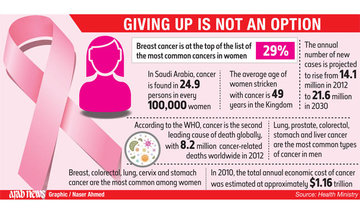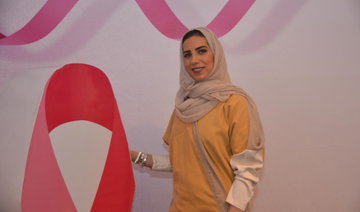JEDDAH: Every woman should know the basic facts about breast cancer because the earlier the disease is diagnosed, the more likely she is to survive.
What is breast cancer?
One of eight women will suffer from breast cancer at some point in her life. One of the first symptoms is a change in the breasts and nipples, such as the emergence of lumps or tumors in the breast, or an abnormal discharge.
Like various cancers, the dysfunctional cells of breast cancer make the tissues of the body grow out of control. Cancer can spread to other areas of the body, causing cancer there too. It is, therefore, necessary to pay attention to such changes and have a medical examination as soon as possible. This helps to treat cancer more easily and increases the chances of survival.
Cancer treatment usually begins with surgery. This may range from simply removing the tumor or the lymph nodes, and, sometimes, the entire breast if required. This is followed by a period of intensive medical treatment (chemotherapy), radiotherapy and sometimes hormonal therapy.
Men can also develop breast cancer, so men should pay attention to abnormal changes in the chest area.
Reduce the risk of breast cancer through screening
The causes of breast cancer are difficult to determine. Sometimes, cancer is genetic, and there are certain things that increase the possibility of developing it. The risks increase according to certain conditions such as gender (females are more likely to get breast cancer than males), race, and age. This cannot be controlled, but some things that affect the likelihood of getting the disease, such as drinking alcohol, lack of movement and obesity, can be avoided. Dealing with these conditions reduces your risk of developing breast cancer. Just walking about 2.5 hours a week can reduce your risk by 18 percent.
It is true that taking birth control pills may increase your risk of breast cancer. However, if women stop taking it, their cancer risk will return to zero.
Women are advised to do self-examination once a month to detect any change in their breasts, such as lumps and swelling. Remember that the breast may have a different texture at different periods of the month depending on the menstrual cycle.
For self-examination, a woman can stand or lie down and use her fingers to feel around the breast in a circular motion. She should try to feel whether there are lumps; also try to squeeze the nipples and look for any discharges and be alert for any changes in color. When you notice any changes, you should see a doctor as soon as possible. But try not to stress, and remember that eight of every 10 tumors are non-cancerous.
Breast cancer and sexual life
It is normal for the disease to affect a woman’s sexual life. However, breast cancer in particular may disrupt her sex life entirely, at least for a certain period of time. This is mainly due to the method of treatment used.
Chemotherapy may make a woman feel tired and nauseated, and as a result of hormonal changes, sex may become uncomfortable, and may cause hair loss, which makes a woman feel less attractive, or lack the readiness to enjoy sexual intercourse. These side effects may last for a while, even after the treatment is over.
Due to the feelings a woman is going through, it is essential that her partner reminds her that she is beautiful and attractive. The partner may be afraid of flattering her appearance for fear of hurting her feelings and may wait for her to take the lead. In these situations, communication between the couple is recommended. She must tell her partner when she is ready on a sexual level and ask him about his feelings. A woman must not do something she is not prepared for just because of her sense of duty or fear of saying no.
Breast cancer: Pregnancy and birth control
It is not true that women who have experienced breast cancer cannot become pregnant again. However, it is advisable to wait a little while until treatment is completed. The woman and her body have experienced great challenges, and she may need some time to recover. It is advisable to consult her doctor to see if she is prepared for the physical challenges of a pregnancy.
If a woman is receiving treatment and wants to have sex, she can use one of the methods of birth control. But it is advisable at first to avoid hormonal methods of birth control and use other methods, such as condoms. As soon as she completes the treatment, she can discuss birth control options with her doctor and partner.
I have recovered from breast cancer. Now what?
Many women who have had breast cancer have a fear of re-developing the disease. But there are some things a woman can do to reduce her chances and enjoy her daily life just like before.
First, a woman must take care of her physical and emotional needs. She has gone through a difficult experience, and she and her body need a lot of rest. She should also maintain a healthy lifestyle: Eating healthy food, reducing stress (try yoga or meditation), avoiding alcohol and exercising regularly. Of course, she should also regularly check her body and continue checkups with her doctor.
Some women who have been cured of cancer may feel guilty because they have overcome the disease at a time when none have survived. Guilt is normal and does not have to be kept inside. She can write down her feelings or talk to someone she trusts. Expressing and exploring these feelings will help her deal with them sooner or later.





























